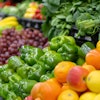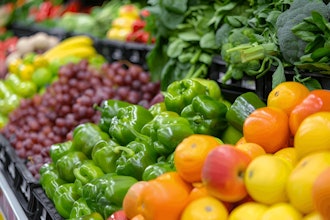NUS JUBAIL, West Bank (AP) — The Palestinian olive harvest, an ancient autumn ritual in the West Bank, is going upscale.
In an emerging back-to-the-land movement, Palestinian farmers are turning the rocky hills of the West Bank into organic olive groves, selling their oil to high-end grocers in the U.S. and Europe.
The move is a reflection of the growing global demand for natural, sustainable and fairly traded products, albeit with a distinct Palestinian twist. The hardships faced by local farmers, ranging from a lack of rainfall to Israeli trade obstacles, mean that organic growing is one of the few ways Palestinians have to compete in outside markets.
"The Palestinian future is in the land," said farmer Khader Khader, 31, as he stood among his organic olives in the northern West Bank village of Nus Jubail.
Organic farming has grown into a thriving business, by Palestinian standards, since it first was introduced in the West Bank in 2004. Now, at least $5 million worth of organic olive oil is exported annually — about half of all Palestinian commercial oil exports, said Nasser Abu Farha of the Canaan Fair Trade Association, one of the companies that sells high-end organic olive oil to distributors abroad.
The West Bank-based company purchases the oil at above market prices and pays what's called a "social premium" — extra money to farming cooperatives to improve their communities.
About 930 farmers have fair-trade and organic certification, while another 140 are "converting" their land — a two- to three-year process during which they stop using chemical fertilizers and pest controls while monitors from Canaan and the Palestine Fair Trade Association provide training and check soil for chemical levels.
Their work is overseen by the Swiss-based Institute for Market Ecology, which is accredited to certify organic products for the U.S., E.U., and Japan. Hundreds more farmers are simply certified as fair-trade, where they and their workers are paid decent wages for their work and produce.
The trade is tiny when compared to major olive growers like Spain, Italy and Greece. But it's significant for Palestinians, for whom harvesting olives is a cultural tradition that gathers even the most urbanized families.
An average of 17,000 tons of olive oil is produced in the West Bank every year by thousands of farmers, according to aid group Oxfam, which works on the olive industry. Most is for local or personal use, and only about 1,000 tons is exported a year, though that number is likely higher since many farmers sell oil informally through relatives abroad, Abu Farha said.
Organic farmers hope the high-end trade will keep them on their lands, despite difficult odds and high overhead costs.
Palestinians seek the West Bank as the heartland of a future independent state. Most of the 2.5 million Palestinians in the West Bank live under a semi-autonomous government. But Israel, which captured the West Bank in the 1967 Mideast war, wields overall control. Roughly 500,000 Jewish settlers live in the West Bank and neighboring east Jerusalem, taking away resources.
The situation makes exporting difficult for Palestinian farmers. Outside markets for fresh produce aren't profitable. Goods must cross through Israeli-controlled export crossings with security measures that cause delays, lowering quality through exposure to sunlight and constant reloading from one truck to another.
Farmers face other problems. More than 120 Jewish settlements dot the West Bank, often encroaching on Palestinian farmlands or preventing farmers from reaching their land. According to U.N. estimates, nearly 10 percent of Palestinian farmland falls on the "Israeli" side of the separation barrier Israel has built to prevent militants from entering from the West Bank to carry out attacks.
Israel also controls more than 80 percent of the West Bank's water in lopsided sharing agreements, said Palestinian water official Ribhi al-Sheik. In other areas dilapidated water pipes have wasteful leaks. Most farmers depend on rain and unlicensed wells, depleting already-stressed aquifers. In some parts, Israeli military authorities also ban rain-collecting cisterns. Badly planned Palestinian towns have paved over fertile lands.
Israeli military spokesman Guy Inbar said the long export process was solely for security reasons and "not intended to harm" exports, noting that Palestinians export some 100,000 tons of fresh produce a year. He said Palestinians access more water than what is allowed for under sharing agreements and that farmers with permits are able to reach land on the other side of the separation barrier.
The challenges sparked a new way of thinking: Palestinians had to make finished goods that could survive the rough growing conditions and lengthy journey to outside markets.
Fair-trade, organic products that can be rain-fed, particularly olives, were the perfect solution.
"It's the future of Palestinian exports. The future is in added value, through environmental and social accountability," said Abu Farha of Canaan Fair Trade. "People want to know: "Where is this oil coming from? Whose life is it changing?"
The changes are visible in Nus Jubail, a village crowded with olives and pines, its 400 residents in houses with blue doors and rooftops sheltered by grape arbors. A decade ago, most residents pressed their oil for personal use. Little was sold commercially and prices were low, said Khader, the farmer.
Around 2004, agricultural activists formed the Palestinian Fair Trade Association, seeking out farmers across the West Bank. They persuaded Khader to establish an organic cooperative of five farmers, allowing them to collectively press their olives and sell better-priced oil.
During the three-year conversion process, Khader and his colleagues were taught to grow olives without chemicals, pruning and plowing instead of using herbicides and fermenting sheep droppings into fertilizer. Once certified, Khader and his partners sold their oil above market prices, attracting other recruits. Now 18 of the village's 30 farmers are organic.
This year, organic oil is selling for about $5.40 a liter — a dollar higher than conventional oil, said Abu Farha of Canaan Fair Trade, which purchases much of the oil. Other independent farmers are selling directly to consumers for $9 a liter, far above market price.
Farmers are going organic on other products, such as maftoul, a chewy sun-dried staple resembling couscous, as well as dried almonds and a savory spice blend of thyme, hyssop and other herbs known as zaatar.
But high-end oil is key.
In Whole Foods supermarkets in New York and New Jersey, it's sold under the "Alter Eco" brand, Abu Farha said. It's in Sainsbury's in Britain, and in boutique shops globally through Canaan and other distributers. Dr. Bronner's Magic Soap, a popular organic, fair traded vegan soap, sources 95 percent of its oil — some 165 tons — from Palestinian growers, the soap company said.
Even so, challenges abound. Palestinian oil production is irregular because they can't irrigate their crops and export costs are still high. Abu Farha of Canaan said some farmers have cheated by mixing conventional oil into their products.
Still, the move toward organic, sustainable farming is an important, elegant fight.
"I don't throw rocks," said farmer Khader, referring to young men who frequently hurl stones during demonstrations. He pointed to his rock-built terraces. "I use them to build our future."






















